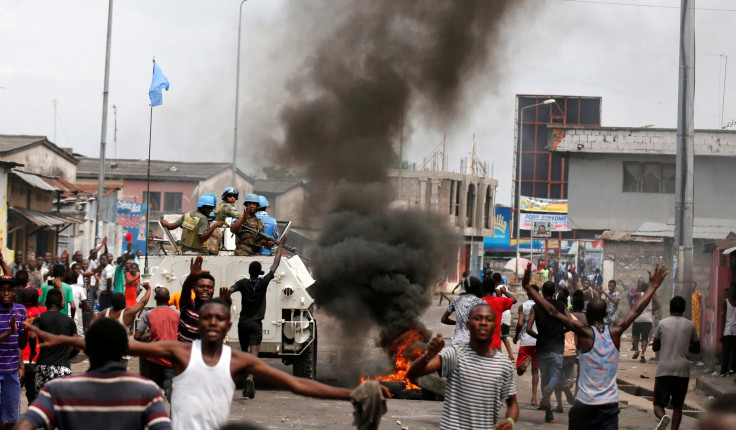DRC: Civilians arrested 'simply for wearing red clothes' as Congolese speak of frustration
Lucha activist tells IBTimes UK of fears as youths 'form groups' to protest against President Kabila using violence.
Authorities in the Democratic Republic of Congo (DRC) have arrested large numbers of people "simply because they were wearing red clothes", claimed a pro-democracy activist. Security services said people wearing the colour were trying to give President Joseph Kabila "the red card" for refusing to step down, he added.
The resource-rich African nation is on a political knife-edge after Kabila stayed in power on Tuesday (20 December) despite the expiration of his last constitutional term in office, but his administration announced a new government in an apparent effort at appeasing opposition criticism.
The regime quelled protests against Kabila's perceived attempts to remain in power beyond the legal limit set by the constitution with an excessive and visible deployment of a military dispositive all over the country, alongside police patrols.
"Everyone who was wearing a red item of clothing was arrested in Goma yesterday. More than 40 people were arrested that way," Serge Sivya, a young activist of pro-democracy youth movement Lutte pour le Changement (Struggle For Change, Lucha), exclusively told IBTimes UK from Goma. He described the situation in the city as calm on Tuesday morning. Independent reports from human rights groups confirmed the arrests.
Sivya said: "The president has really invested in the menace. A police official said they would prevent people from demonstrating in the streets in all major cities, in Kinshasa, Lubumbashi, Goma and Bukavu. Obviously, since Sunday, police officers and military forces have invested all the junctions."
Sivya confirmed a Lucha activist, Fabrice, was also arrested yesterday by two government intelligence agency Agence Nationale de Renseignements (ANR) officers and is still detained in a cell in the Goma commune. "He was arrested because an officer recognised him and knew he was a Lucha activist. He was arrested simply for that," Sivya said.
Authorities are yet to formulate a case, and no charges have so far been brought against the detained activist. "Today, we demand to know what charges are against him," Sivya said.
Repeated sounds of gunshots were reportedly heard in the capital Kinshasa where Lucha supporters are also active, hours after police and military forces surrounded students of the University of Kinshasa – known as Unikin – using whistles. Braving security forces, residents were out in the streets, chanting slogans, on Tuesday morning.
Sivya said: "This is a widespread campaign of intimidation, people are scared of going out in Goma and Kinshasa. Today, in Goma, people are going out but they are feeling very fearful of the huge police and army deployment, patrolling everywhere, because, at any time, they can start firing with heavy weapons."
'They must know that no one can govern a country by challenge or threat'
Authorities announced the new interim government "purely to defy the will of the Congolese people", Sivya claimed, explaining that Congolese were only expecting an interim government to be appointed at the conclusion of the "national dialogue" mediated by DRC's powerful Catholic Church (CENCO).

While the activist said "frustration is still very big", he described how fellow Congolese were "holding back because we are scared of the determination of armed groups." On Monday, seven people were killed, including a member of National Police and a Monusco peacekeeper, and two peacekeepers injured in Mayi-Mayi militia attacks on several areas of Butembo, Beni territory, in North Kivu province. Monusco strongly condemned the attack.
There is a real risk armed rebels could use the political crisis as a some sort of justification "to retake up arms and reclaim 'lost terrain'" amid a security vacuum in some areas, according a human rights activists monitoring the situation.
Monusco, the UN peacekeeping mission, and Kabila's government have heavily deployed their troops and presence in cities such as Kinshasa and Katana where opposition is high and youths are "leaving many 'hot areas' and their population vulnerable to attack", Vava Tampa, the founder of Save the Congo, exclusively told IBTimes UK. "I also fear sections of the regime could encourage many militia groups to do just that to create chaos and use it to cling to power," he added.
In Goma, Sivya said Lucha has received credible reports of young people who formed groups to protest using violence.
"We believe they could be armed. In light of this, and because we didn't want to be confused with them, we just wanted to enter in the quartiers (neighbourhoods) to speak to people but did not call for frontal demonstrations," Sivya explained. "While we deplore the fact that this tension could bring some people to protest using violence, we continue to think about actions to carry out because it is not acceptable that Kabila's mandate came to an end and nothing happened. It is not acceptable that he thinks that everyone agrees with him.
In light of this risk, Lucha said it has not finalised plans for action on the ground. "We need to think of a strategy – how are we going to demonstrate and not be confused with those people – that's our challenge today because demonstrations need to take place."
"It's important for the world to know that, if Congolese people are not protesting against Kabila's clawing to power, it is not because we are naive and that they [the regime] have won. They must know that no one can govern a country by challenge or threat. As long as the people don't agree with this and feels alien to what is happening, there is no guarantee that, at any time, things will develop that they won't be able to stifle."
A top adviser to the president, Michael Sakombi, told IBTimes UK: "We will do the best we can to ensure stability and peace because we are the government. We can't let people get on the streets and start destabilising the country."
© Copyright IBTimes 2025. All rights reserved.






















